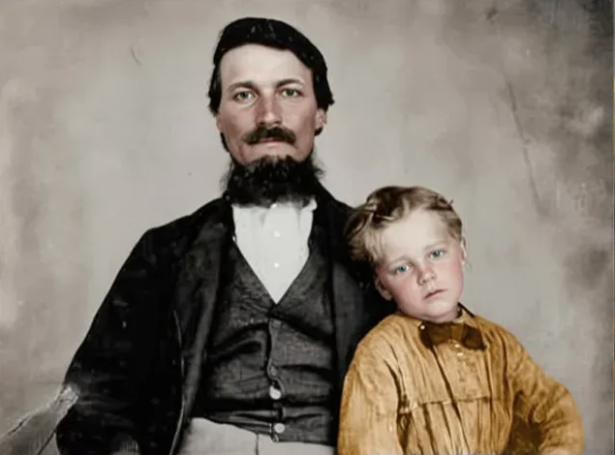
Wyoming, 1878. The ground was frozen solid, hard as iron, impossible to break. When Ethan Crowe’s wife died, he had no choice but to bury her in the unforgiving earth, knowing winter would hold her until spring. Hours later, his worst fear arrived: his young son burned with fever, the kind that takes children quickly in a time before antibiotics or emergency rooms.
The nearest doctor was three days away by horseback. Three days across open prairie in the dead of winter, through blizzards that could bury a man and his horse in hours. Most people would have stayed. Would have prayed. Would have accepted that some things are beyond human control.
Ethan didn’t accept it. He wrapped his feverish boy in wool, held him close to his chest, and climbed onto his mare. Then he rode straight into the blizzard.
The wind cut through them like knives. Snow blinded them, turning the world into a white void where direction became meaningless. Ethan whispered through cracked lips, “Hold on, son,” his voice barely audible over the howling storm. The boy’s small body trembled against him, burning with heat even as ice formed on Ethan’s beard.
By the second night, wolves followed. Their howls rose and fell in the darkness, shadows circling just beyond the firelight Ethan managed to build with numb fingers. The mare’s breath came in ragged clouds, ice crusting her nostrils. Ethan held his son tighter, whispering prayers he didn’t know if anyone heard.
On the third morning, they reached the half-frozen Wind River. The crossing was suicide—ice chunks floated in black water, the current strong enough to sweep them both away. Ethan looked down at his son, the boy’s eyes glassy with fever, his breathing shallow.
“Not you too,” Ethan whispered. He’d buried his wife that week. He would not bury his son.
He urged the mare forward. The water bit through his clothes, stealing what little warmth remained. The boy clung to him, silent now, too weak to even cry. The current pulled at them, but the mare fought, her legs churning through water that wanted to claim them both. They made it across, soaked and frozen but alive.
When Ethan finally crashed through the doctor’s door on the third morning, he was barely conscious. Ice had formed on his clothes. His lips were blue. He collapsed, clutching his son, and managed one word: “Save him.”
The doctor worked through the day and into the night. Ethan sat by the fire, unable to move, unable to think beyond the sound of his son’s labored breathing. And then, finally, the fever broke. The boy’s eyes opened, clear for the first time in days. He would live.
Years later, that boy grew up and had children of his own. He told them the story of the father who rode through a blizzard, across frozen rivers, past wolves in the night—all to save his life. He told them that a father’s love can outlast winter, can survive when logic says to give up, can cross impossible distances when everything else has been lost.
The photograph shows Ethan and his son after they’d both survived—the father with weary eyes that had seen too much, the boy with the solemn expression of someone who’d been pulled back from death’s edge. They sit together, proof that sometimes will is stronger than circumstance. That sometimes love refuses to let go, even when the world says it’s time.
In 1878, in the frozen wilderness of Wyoming, a father made a choice. He rode into a blizzard because staying meant watching his son die. He crossed a half-frozen river because turning back meant giving up. He whispered “hold on” through three days of hell because those were the only words that mattered.
And his son held on. And they both made it. And the story of that ride became a testament to something we forget too easily: that fathers’ love—real, fierce, unwavering love—can outlast winter. Can survive anything. Can bring you home even when the world tries to bury you in ice.